The Great Famine, Some Recent Titles
Published on 18th January 2013
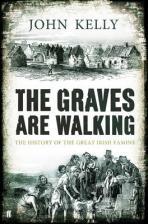 Between 1845 and 1850, out of a population of approximately 8.2 million, some one million died and another million were forced to emigrate. By 1881 the population had fallen to 5.2 million and continued to fall for many more years. The Great Famine, otherwise known as the Great Hunger, impacted on Ireland and her people like no other event in history, and in world terms the famine is rightly termed one of the greatest catastrophes of the modern era.
Between 1845 and 1850, out of a population of approximately 8.2 million, some one million died and another million were forced to emigrate. By 1881 the population had fallen to 5.2 million and continued to fall for many more years. The Great Famine, otherwise known as the Great Hunger, impacted on Ireland and her people like no other event in history, and in world terms the famine is rightly termed one of the greatest catastrophes of the modern era.
In recent times a number of new histories of the great famine have been published, and having just finished reading one of these, I thought I might stir your interest in this period of Irish history by reference to those recent publications that have come to my attention.
Of course I can't mention the new without first mentioning one not so new that most of us have likely come across at some point or other, most probably in our school or college days. "The great hunger, Ireland 1845-1849" by Cecil Woodham-Smith was first published in 1962 and remains one of the most widely read books on Irish history.
But to the new. I recently read "The Graves are Walking, a history of the Great Irish Famine" by Irish-American history writer John Kelly (London Faber 2012. 397pp.). This book, based on detailed research involving primary sources, is an involving read but not an easy one. There is a wealth of personal accounts and stories of the impact of the famine across the length and breadth of Ireland, and fitting all this material into a readable volume was I'm sure no easy task, but this I think he has largely succeeded in accomplishing. The author's conclusion that the famine was a genocide in outcome if not in intent is one some readers and scholars might take issue with; I think further reading of scholarly works on the famine period is necessary regardless. One can read a review of this book published in The Irish Times from September 2012.
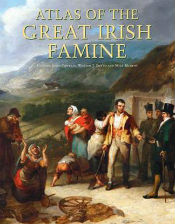
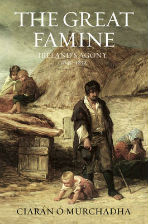 The recently published "Atlas of the Great Irish Famine" (Cork University Press, 2012. 726pp., 200 maps, 400 illustrations), edited by John Crowley, William J. Smyth and Mike Murphy, in my estimation is sure to become the definitive reference work on the famine. This hefty 700 page volume is a very comprehensive work containing a wealth of illustrations and maps, and bringing it to print involved the efforts of a large number (60) of contributing writers. It won the International Education Services Best Irish Published Book of the Year at the Bord Gáis Energy Irish Book Awards 2012. Most of the copies in our branch libraries are reference only, but there are a small number of copies for borrowing.
The recently published "Atlas of the Great Irish Famine" (Cork University Press, 2012. 726pp., 200 maps, 400 illustrations), edited by John Crowley, William J. Smyth and Mike Murphy, in my estimation is sure to become the definitive reference work on the famine. This hefty 700 page volume is a very comprehensive work containing a wealth of illustrations and maps, and bringing it to print involved the efforts of a large number (60) of contributing writers. It won the International Education Services Best Irish Published Book of the Year at the Bord Gáis Energy Irish Book Awards 2012. Most of the copies in our branch libraries are reference only, but there are a small number of copies for borrowing.
"The great famine, Ireland's agony 1845-1852" by Dr Ciarán Ó Murchadha (London, Continuum, 2011. 272pp.), is described by the Times Higher Eduction Supplement as a "popular account based on scholarly research", the reviewer further stating that "the result is a highly readable, nuanced book". The author is based at the Department of History at the National University of Ireland, Galway.
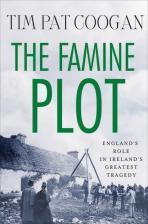 "The famine plot, England's role in Ireland's greatest tragedy" (London, Palgrave Macmillan, 2012. 287pp.) is written by Tim Pat Coogan, one of Irelands' best known historians and the author of books on the IRA, De Valera and Collins. I have read where a reviewer claims this book to be a "fiercer and angrier" book than Kelly's book mentioned above.
"The famine plot, England's role in Ireland's greatest tragedy" (London, Palgrave Macmillan, 2012. 287pp.) is written by Tim Pat Coogan, one of Irelands' best known historians and the author of books on the IRA, De Valera and Collins. I have read where a reviewer claims this book to be a "fiercer and angrier" book than Kelly's book mentioned above.
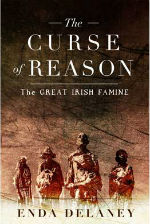 "The curse of reason, the great Irish famine" by Dr Enda Delaney (Dublin, Gill & Macmillan, 2012. 303pp.) is said to focus primarily on the years to 1848 and largely on the testimony of four main contemporaries: John MacHale the Catholic Archbishop of Tuam, John Mitchel the radical nationalist, Elizabeth Smith the Scottish-born wife of a Wicklow landlord, and Charles E. Trevelyan the Assistant Secretary to the Treasury. The Times Higher Education Supplement describes the narrative as at times "gripping", and the book as "one of the most fluent and original" on the topic of the famine. The reviewer further states that "although... based on large amounts of primary research, its style is accessible and engaging, and the result is a valuable study of a truly harrowing crisis." The author is a historian at the University of Edinburgh.
"The curse of reason, the great Irish famine" by Dr Enda Delaney (Dublin, Gill & Macmillan, 2012. 303pp.) is said to focus primarily on the years to 1848 and largely on the testimony of four main contemporaries: John MacHale the Catholic Archbishop of Tuam, John Mitchel the radical nationalist, Elizabeth Smith the Scottish-born wife of a Wicklow landlord, and Charles E. Trevelyan the Assistant Secretary to the Treasury. The Times Higher Education Supplement describes the narrative as at times "gripping", and the book as "one of the most fluent and original" on the topic of the famine. The reviewer further states that "although... based on large amounts of primary research, its style is accessible and engaging, and the result is a valuable study of a truly harrowing crisis." The author is a historian at the University of Edinburgh.
You can locate many other works on the great famine in our library catalogue.